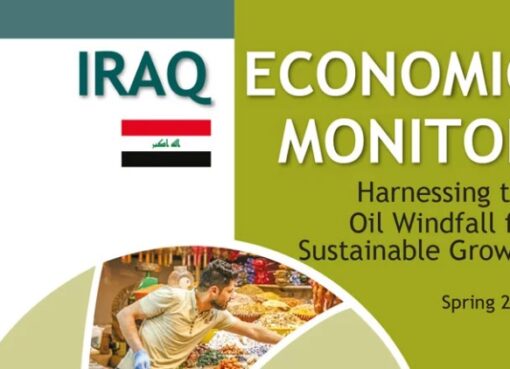Download
Commentary on IEA Report: Iraq Energy Outlook, by Tariq Shafiq *
VC, IEA Energy Business Council ,Friday, 19 October, 2012
Mr Chairman, ladies & gentlemen:
It is a privilege to address you on the subject of the path of Iraq energy sector, covered by the IEA Study of Iraq Energy Outlook
I will go over the main conclusions and express some thoughts thereabout to trace Iraq’s position.
From the outset, I wish to congratulate Dr Birol and the IEA team, whose work has produced one of the most authoritative studies on Iraq’s Energy Outlook.
It is the work of professionals whose dedication must have overcome the many challenges, such as, the lack of sufficient reference data, on a subject which demands multi-scientific understanding to collect and review available data and to identify and fill-in the missing gaps, and to get the facts right in order to predict the outlook.
I am impressed by the professionalism with which politically sensitive issues have been analysed and reported in the Study and publicised formally in Iraq and informally to the media by Dr Birol.
Going into the specifics:
-
The report covers realistically the principal elements of the economic and technical aspects of Iraq’s three production scenarios, and wisely recommends a balanced Central Scenario from the point of view of the possible rate of the physical execution of the development plans and market fundamentals related to potential supply and demand. The choice of the three scenarios reflects realistically market uncertainties and the presence of the many challenging impediments in Iraq.
-
The Central Scenario predicts that Iraq’s oil output will reach 6.1mn b/d by 2020 and 8.3mn b/d by 2035. But, Dr Birol warns that “should managerial or political bottlenecks seriously hold-up upstream expansion, a delayed Scenario could result, leading to output of only 4mn b/d by 2020 and 5.3mn b/d by 2035, destabilising the market with equally dire consequences for the Iraqi economy.”
-
I am glad that the Study concludes, stressed by Dr Birol in his interviews, that the realisation of the central scenario and the accruing return benefits into the economy and GDP are conditional on Iraq’s decision makers working to a plan, in harmony and in accordance with good governance principles.
-
Furthermore, a failure to improve oil industry management and achieve political agreement over the control of hydrocarbon resources could have dire implications for production growth. “It is in everyone’s immediate interest to find a permanent agreement on the governance of hydrocarbons and oil and gas revenue sharing.” Disagreement has slowed down oil development and contributed to destabilizing Iraq’s body politic. In other words, more governance and less politics.
-
In the meantime, a few requirements have been stressed to have to happen in time:
-
Iraq’s net water injection requirements will increase from 1.6mn b/d in 2011 to more than 12mn b/d in 2035 at a time ExxonMobil left it earlier this year, and SNC-Lavalin dropped out and CH2MHill is yet to be appointed.
-
In addition to export pipeline rehabilitation, Iraq has much work ahead to improve offshore loading facilities and build-up storage at Fao.
-
Other companies besides Exxon, Total and Statoil have left and/or have expressed a readiness to abandon their contracts for various reasons, be they techno-economic, an inability to cope under Iraq’s present culture, and/or political reasons.
-
IOCs are faced with the need to re-negotiate their contracts to lower development production rates, which is a complex exercise, and may cause further dropouts.
-
It has been highlighted that the Central Scenario places Iraq as the major global export player, where for each two future barrels incremental demand Iraq would be providing almost one barrel.
-
But Iraq today is politically unstable, while long-term clients require security of supply to make the necessary long-term investment required for gearing-up their refineries to the long-term use of Iraqi crude supplies and quality.
I have some issues of minor concern worthy of mentioning:
-
Principle data such as CAPEX and OPEX require credible references and/or researched derivation to ascertain the degree of their validity, which in turn reflects on the cash in and out. The adopted estimates, however, tend to be conservative. The effect however is minor.
-
The suggestion for Iraq to become a swinger, while commensurate for a stronger market position, may not be justified on economic grounds, as Iraq needs capital to go into the many urgent basic needs of its people.
-
Iraq’s main transfer pipelines to export terminals are under serious risk of stoppage in the prevailing security conditions in the Middle East. A closure of the Straits of Hormuz would have disastrous consequences to Iraq’s main oil exports. No declared government policy.
-
The study clearly points out that Iraq is at risk of almost total dependence on oil income. Diversification into other resources is a must. Wouldn’t agriculture be the obvious choice?
-
And that the hydrocarbon industry, especially the upstream end, is highly capital intensive and Iraq needs to diversify into other investment venues to resolve the serious issue of Iraq’s high level of unemployment, especially among the young. Again, agriculture I would have thought is the obvious avenue. Unemployment is as high as 30% according to some reports.
-
I am not sure how feasible the study’s suggestion is, though made with some reservation, to invest in downstream export refineries and petrochemicals. I personally suspect its economic feasibility, especially if oil and gas are booked, as they should, at their export values. Project cost in Iraq and generally in the Middle East is some 50% to 100% higher than its equivalent in the US Gulf.
You may add that operations and management requires expatriate staff, as well, and you are faced with latest art of technology under the command of your competitors.
-
Renewables and, in particular, solar energy did not have much mention in the Report. With oil subsidy on the decrease, investment in solar energy becomes even more economically feasible.
No legal framework to promote the renewable has yet been enacted.
-
The Report mentions that there are international examples of both types of contractual arrangements (technical service contracts (TSC) and production-sharing agreements (PSA)) within national approaches to resource development. Our original draft Petroleum Law, adopted by the MoO, did include the PSA as a model contract, besides the TSC. The PSA model has been omitted on the premise that the PSA infringes on the sovereignty of the state where decisions become joint, while the State remains the sole decision-maker in the TSC. But, the fact, however, is that the present MoOs model TSC still leaves decisions to the joint parties, the contractor and government in the Joint Management Committee on the ground that the contractor is an investor.








Comment here